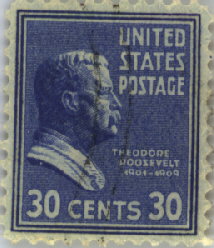FRtR > Outlines > American History (1990) > Chapter Six > Social criticism becomes widespread (9/11)
An Outline of American History (1990)
Chapter Six
Social criticism becomes widespread (9/11)
< Previous Page * Next Page >
In domestic as well as international affairs, Roosevelt's
accession coincided with a new epoch in American political life. The
continent was peopled, the frontier was gone. A small, struggling
republic had become a world power. The country s political
foundations had endured the vicissitudes of foreign and civil war, the
 tides of prosperity and depression. Immense strides had been
made in agriculture and industry. Free public education had been
largely realized. A free press had been maintained. The ideal of
religious freedom had been sustained. Yet thoughtful Americans
were not complacent about their social, economic, and political
situation. For big business was now more firmly entrenched than
ever. Often, local and municipal government was in the hands of
corrupt politicians. And a spirit of materialism was infecting every
segment of society.
tides of prosperity and depression. Immense strides had been
made in agriculture and industry. Free public education had been
largely realized. A free press had been maintained. The ideal of
religious freedom had been sustained. Yet thoughtful Americans
were not complacent about their social, economic, and political
situation. For big business was now more firmly entrenched than
ever. Often, local and municipal government was in the hands of
corrupt politicians. And a spirit of materialism was infecting every
segment of society.
Against these evils arose a full-throated protest that gave
American politics and thought its peculiar character from
approximately 1890 to World War I. It was not altogether a new note.
Since the early days of the Industrial Revolution, farmers had
been fighting a battle against the cities and against the rising
industrial magnates. As far back as the 1850s, reformers had leveled
sharp criticism at the system of patronage by which successful
politicians distributed government positions to their supporters.
After a 30-year struggle, the reformers achieved the passage, in
1883, of the Pendleton Civil Service Bill. This law, establishing
a merit system in government service, marked the beginning of
political reform.
Industrial workers also had spoken up against injustices.
The Knights of Labor, which they founded in 1869 for
self-protection, had a membership of 700,000 by the middle 1880s.
After that date, the organization declined, but it was soon
replaced by the American Federation of Labor, a powerful
organization of craft unions. By 1900, labor was a major force.
Almost every notable figure of the period, whether in politics,
philosophy, scholarship, or literature, derived his fame, in part,
from his connection with the reform movement. The heroes of
the day were all reformers, strongly protesting practices and
principles inherited from the 18th century rural republic that
proved inadequate for a 20th-century urban state.
The years 1902 to 1908 marked the era of greatest reformist
activity. Years before, in 1873, Mark Twain had exposed Amer-
ican society to critical scrutiny in The Guilded Age. Now, trenchant
articles dealing with trusts, high finance, impure foods, and
abusive railroad practices began to appear in the daily newspapers
and in such popular magazines as McClure's, Everybody's, and
Collier's. Upton Sinclair, using fiction as his medium, published
The Jungle, exposing unsanitary conditions in the great Chicago
meat-packing houses and the grip of the beef trust on the nation's
meat supply. Theodore Dreiser in The Financier and The Titan
made it easy for laymen to understand the machinations of big
business. Frank Norris' The Pit clarified much of the agrarian
protest. Lincoln Steffens' The Shame of the Cities bared political
corruption. This "literature of exposure" had a vital effect in
rousing the people to action.
The hammering impact of uncompromising writers and an
increasingly aroused public spurred political leaders to practical
measures. Several states enacted laws to improve the conditions
under which people lived and worked. For example, child-labor
laws were strengthened and new ones adopted, raising age limits,
shortening work hours, restricting night work, requiring school
attendance.
< Previous Page * Next Page >
 tides of prosperity and depression. Immense strides had been
made in agriculture and industry. Free public education had been
largely realized. A free press had been maintained. The ideal of
religious freedom had been sustained. Yet thoughtful Americans
were not complacent about their social, economic, and political
situation. For big business was now more firmly entrenched than
ever. Often, local and municipal government was in the hands of
corrupt politicians. And a spirit of materialism was infecting every
segment of society.
tides of prosperity and depression. Immense strides had been
made in agriculture and industry. Free public education had been
largely realized. A free press had been maintained. The ideal of
religious freedom had been sustained. Yet thoughtful Americans
were not complacent about their social, economic, and political
situation. For big business was now more firmly entrenched than
ever. Often, local and municipal government was in the hands of
corrupt politicians. And a spirit of materialism was infecting every
segment of society.